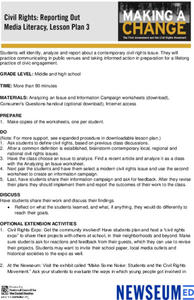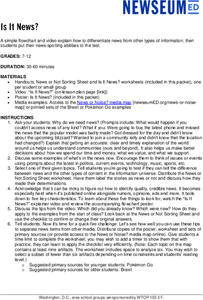Newseum
Things Change, Things Stay the Same
Securing women the right to vote was a long time coming. Over the years, some aspects of the suffrage movement changed, and some things remained the same. Pupils research three time periods and collect evidence of key people, strategies,...
Texas Education Agency (TEA)
Proofreading
Where's the proof? Using the resource, scholars learn proofreading marks and complete a series of worksheets to practice using them correctly. Then, they make intentional errors to a writing passage before switching with a partner to...
British Council
21st Century Jobs
Let's get to work! Using the resource, pupils discover some of the environmental impacts of the workplace, completing a worksheet on 21st-century jobs. Next, they work in small groups to collaboratively write four ideas about the future...
British Council
Farming and the Environment
What is the connection between farming and the environment? Scholars complete a worksheet to learn about the environmental impacts of farming. Next, individuals assume the identity of someone within a farming community and role play...
British Council
Water for All
It's time to take action. In small groups, scholars read texts about the global water crisis. Next, they create campaign posters to inform the community about the issue, as well as possible solutions.
British Council
Storm coming!
A storm is brewing. Scholars use the resource to listen to news reports about extreme weather events from different parts of the world. Pupils then role play an emergency meeting to save their town from a dangerous weather emergency.
British Council
Family Footprint
Working in small groups, pupils design a questionnaire to survey classmates about their carbon footprints. Then, after discussing the activity with group members, they share with the class an interesting fact they learned.
British Council
Chocolate
Are you the biggest chocoholic? Scholars read text about people eating chocolate and sequence the text by putting them in order of who ate the most to least chocolate. They quiz classmates to discover who is the biggest chocoholic in the...
Newseum
Propaganda Through History: Analyzing Historical Sources
Working in teams, pairs, or individually, scholars select one resource from a gallery of historical sources and consider which examples might be considered propaganda, the techniques used to persuade audiences, and evaluate how the...
Newseum
Civil Rights: Reporting Out
After brainstorming a list of contemporary local, regional, and national civil rights issues, pairs of scholars select one of these issues and design an information campaign to spread awareness of the issue.
Newseum
Covering a Catastrophe: Evaluating Disaster News
Young journalists investigate the various ways to share news about a disaster and evaluate the pros and cons of each of these types of news. Individuals then select two different forms of media reports of a recent disaster. Using the...
Newseum
'The Press and the Civil Rights Movement' Video Lesson
Scholars watch a video featuring journalists who covered the civil rights movement, then respond to questions on a viewing guide. The video features interviews with participants and original news footage from the 1950s and 1960s. In...
Newseum
Is It News?
Is it news or not? That is the question young journalists must consider in a lesson plan about newsworthiness. Class members watch a short video that details five key characteristics of quality, credible news. Individuals then use these...
Newseum
From the Front Page to the History Books
Young journalists compare news coverage of four major events with how the same events are covered in historical accounts. The ensuing discussion asks class members to compare and contrast the role of a reporter and the role of a historian.
Newseum
Journalists Code of Ethics
Journalists are supposed to adhere to a Code of Ethics. To determine the degree to which reporters follow this code, individuals select three recent stories with photographs from newspapers, magazines, online news sites, or television...
Newseum
Disinformation Nation: Separating Politics and Propaganda
Separating political rhetoric from propaganda is no small feat. Class members are challenged to examine two different sources about a candidate in an upcoming election and determine whether the primary purpose of the source is to inform...
Newseum
Reporting Part III: Staying Objective
The third and final lesson in the Reporting series tests young journalists' ability to be objective in reporting contentious topics. After brainstorming a list of contentious topics that interest them, the class selects one, and...
Newseum
Reporting Part II: Beyond the Basics
Scholars examine the articles written for the series' first activity and select ones that would benefit from further research. In a 48-hour deadline, teams of three select one topic to investigate in greater depth and craft a revised...
Newseum
Reporting Part I: What Matters to Me
Young reporters have an opportunity to craft a news story about a topic that interests them. Class members brainstorm events and issues that affect them and possible sources of information. Individuals then select a topic, research it,...
Weber County Library
Weber Reads: The Adventures of Huckleberry FInn
A 32-page instructional pack contains eight lesson plans for use with The Adventures of Huckleberry Finn. Lessons include an examination of the role of superstition in the novel, Twain's use of satire, and a discussion of the...
Digital Public Library of America
The Adventures of Huckleberry Finn by Mark Twain
Mark Twain's The Adventures of Huckleberry Finn is the focus of a teaching guide that introduces readers to some of the many controversies surrounding the use of the novel in classrooms. The packet includes 15 primary source excerpts and...
Discovery Education
Writing about Symbolism and Emotion in Huckleberry Finn
To complete a study of The Adventures of Huckleberry Finn, readers select a well-known quotation or symbol from the novel to use in an essay that analyzes how the quotation or symbol relates to the novel's themes.
Simon & Schuster
Curriculum Guide to: Adventures of Huckleberry Finn by Mark Twain
Five lessons make up a curriculum guide to The Adventures of Huckleberry Finn. Readers find examples of Twain's use of irony, closely examine Huck's colloquial language, as well as his sense of morality, and identify themes in the novel....
Utah Education Network (UEN)
Lessons Learned in Adventures of Huckleberry Finn
To conclude a study of The Adventures of Huckleberry Finn, class members create illustrated newsletters about Huck's lessons as he journeys down the Mississippi River. Using Microsoft Publisher, pairs copy, save, and import illustrations...

























